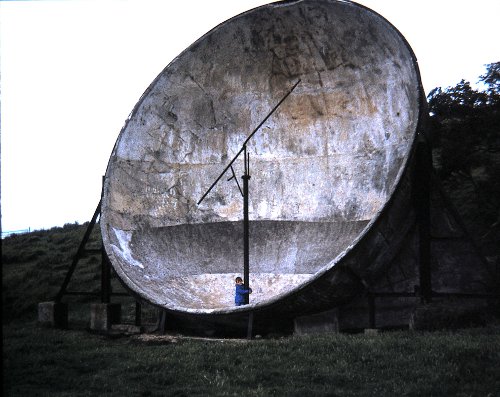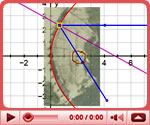When Walls Had Ears at Travelogue of an Armchair Traveller.
Sound mirrors
Selsey sound mirror on Google Streetview
More on the Selsey sound mirror
Hythe sound mirror in 1976

A photograph from Graeme Hartley, taken circa 1976 when I was about 8 years old
, showing him with the Hythe Roughs sound mirror when it was in rather better condition than now.
2010 guided walks to the Denge sound mirrors
Likely dates for public access to the Denge mirrors have been announced on the website of the Romney Marsh Countryside Project. Remember, this is the only way to visit the Denge mirrors.
SUMMER 2010 VISITS TO THE SOUND MIRRORS
The sound mirrors are only accessible on one of our guided tours and we have been leading free tours out to the Sound Mirrors for 13 years now. They are on an island, connected by a locked swing bridge on a private gravel workings (owned by CEMEX). The dates for 2010 have yet to be published in our booklet, however they are most likely to be as follows: An Open day from 10 am to 5 pm on Sunday 18th July Guided walks starting at 2 pm on Sunday 8th August and Sunday 26th September. The walks and the Open Day are free of charge and there is no need to book, although we do ask for a donation. The meeting point will be at Lade car park on Coast Drive (half way between the Pilot Pub and Romney Sands) (TR 085 208). Please contact us for more information if needed. Tel: 01797 367934 Fax: 01797 367934
2010-03-10 15:34:57
People planning to join these walks should obviously confirm details with the RMCP before travelling.
Warden Point sound mirror on YouTube
Hidden Teesside
Sonic Marshmallow interview
Graphics.com has an interview with Troika Design Studios which discusses the “Sonic Marshmallows” sound mirror-inspired installation at Wat Tyler country park in Essex.
We see Sonic Marshmallows more as a manifestation of people’s desire to interact with each other, rather than with things. Sonic Marshmallows can be used only in conjunction with another user. Sound mirrors were originally used on the coast of Kent to detect incoming enemy planes, not far from the location were Sonic Marshmallows is installed now. We used the same technology in a way that enables people to communicate with each other instead.
More…
Designing for Human Behavior
Garrett G Jones on sound mirrors at the Designing for Human Behavior blog at the University of Texas at Austin School of Architecture:
…. Microphones placed at foci the of the reflectors enabled a listener to detect the sound of aircrafts several kilometers out in the English Channel. My idea takes this primitive device and relocates it within modern contexts. Sound mirrors or sound theatres can be used at a more urban or residential scale as installations for people to sit and interact within. The premise is to sit within the concrete dome, which could be oriented in any direction, and that sounds of the surroundings become amplified as they are reflected and echoed within the dome.
[More]
Hythe and Denge photos
Talking parabolicality
 Douglas Butler illustrates how to create an Autograph file to test the parabolicality of a sound mirror, at the Association of Teachers of Mathematics website.
Douglas Butler illustrates how to create an Autograph file to test the parabolicality of a sound mirror, at the Association of Teachers of Mathematics website.